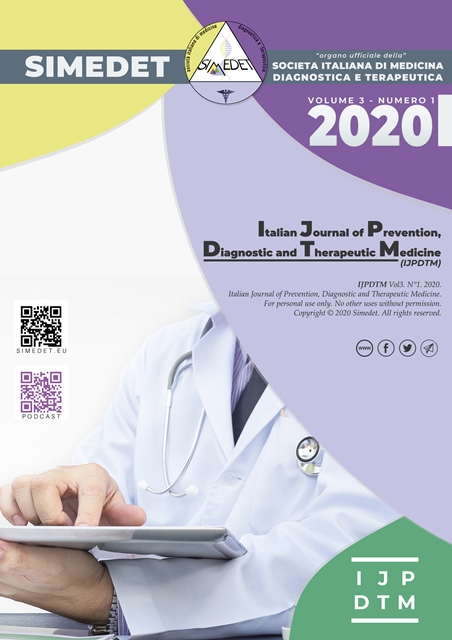The residence for the Issuance of Security Measures (REMS) in Sardinia qualitative study on the nursing role
Main Article Content
Abstract
Aim. This article intends to gather the current perspectives on what characterizes the nursing assistance aimed at the mentally ill offenders, investigating the past, experience and perception that professionals and healthcare assistants (OSS) have towards their work. Also having REMS a relatively recent history, and being present few studies that analyze the context, we intend to try to fill the cognitive gap that is reflected in the current bibliographic blank present in the Italian context.
Materials and methods. A qualitative analysis, based on phenomenology, was carried out using the semi-structured interview as an instrument. The data were subsequently analyzed and validated by transcription, coding, cataloging, interpretation and subsequent methodological triangulation.
Results. From the data collection it was possible to identify the following 5 thematic categories: training and preparation; motivations and emotional impact related to the role in the structure; factors that influence the role; interactions between figures of the Caring Team; role and interventions perceived. It emerged that there are no substantial differences between nurses and OSS and how the approach towards patients is based on care and rehabilitation.
Discussion and conclusions. At present there is no qualification as a psychiatric forensic nurse, although in different international situations he is trying to define it.
The care approach has changed compared to the past, in line with modern humanizing laws in force in psychiatry.
Downloads
Article Details

This work is licensed under a Creative Commons Attribution-NonCommercial-NoDerivatives 4.0 International License.
References
Casacchia M, Malavolta M, Bianchini V, Giusti L, Di Michele V, Giosuè P, et al. Closing forensic psychiatric hospitals in Italy: a new deal for mental health care? Riv Psichiatr. 2015; 50:199–209.
Borzacchiello A. I luoghi della follia. L’invenzione del manicomio criminale. 1872;
Grassi G., Bombardieri C. Il policlinico della delinquenza. Milano: FrancoAngeli; 2016;
De Mattos V. Una via di uscita. Merano: Alpha & Beta; 2012
Maria S, Maria S. Infermiere in manicomio prima della 180: narrare esperienze tra cura e custodia. 1978; 23–44.
Ageing H, La I, Basaglia L. Strumenti e terapie nelle cure psichiatriche: estratti dall’archivio storico dell’ ospedale psichiatrico di Girifalco. 1978
Jansman-Hart EM, Seto MC, Crocker AG, Nicholls TL, Cote G. International trends in demand for forensic mental health services. Int J Forensic Ment Health. 2011;10 :326–36.
Jansman-Hart EM, Seto MC, Crocker AG, Nicholls TL, Côté G. International trends in demand for forensic mental health services. Int J Forensic Ment Health. 2011;10 :326–36.
Nakatani Y, Kojimoto M, Matsubara S, Takayanagi I. New legislation for offenders with mental disorders in Japan. Int J Law Psychiatry. 2010;33:7–12.
Zhao H, Xue L, Shi Y-W, Knoll J. Chinese Forensic Psychiatry: History, Development and Challenges. J Forensic Sci Med. 2015; 1:61.
Devnick B. The forensic mental health nurse: confusion, illusion or specialization? A scoping literature review. 2010;
Happell B, Pinikahana J, Martin T. Stress and burnout in forensic psychiatric nursing. Stress Heal. 2003;19:63–8.
Dickinson T, KM W. Stress and burnout in forensic mental health nursing: a literature review. Br J Nurs. 2008;17:82–87 6.
Hakvoort L, Bogaerts S, Thaut MH, Spreen M. Influence of Music Therapy on Coping Skills and Anger Management in Forensic Psychiatric Patients. Int J Offender Ther Comp Criminol . 2015;59:810–36.
Choi A-N, Lee MS, Lim H-J. Effects of Group Music Intervention on Depression, Anxiety, and Relationships in Psychiatric Patients: A Pilot Study. J Altern Complement Med. 2008;14:567– 70.
Dziopa F, Ahern K. What makes a quality therapeutic relationship in psychiatric/mental health nursing: A review of the research literature. J Adv Nurs Pract. 2009;10 :1–9.
Hakvoort L, Bogaerts S, Thaut MH, Spreen M. Influence of Music Therapy on Coping Skills and Anger Management in Forensic Psychiatric Patients. Int J Offender Ther Comp Criminol. 2015;59 :810–
Choi A-N, Lee MS, Lim H-J. Effects of Group Music Intervention on Depression, Anxiety, and Relationships in Psychiatric Patients: A Pilot Study. J Altern Complement Med [Internet]. 2008;14(5):567–70. Available from: http://www.liebertonline.com/doi/abs/10.1089/acm.2008.0006
Timmons D. Forensic psychiatric nursing: A description of the role of the psychiatric nurse in a high secure psychiatric facility in Ireland. J Psychiatr Ment Health Nurs. 2010;17:636–46.
Dickinson T, KM W. Stress and burnout in forensic mental health nursing: a literature review. Br J Nurs. 2008;17:82–87 6p.
Reininghaus U, Craig T, Gournay K, Hopkinson P, Carson J. The High Secure Psychiatric Hospitals’ Nursing Staff Stress Survey 3: Identifying stress resistance resources in the stress process of physical assault. Pers Individ Dif. 2007;42:397–408.
Happell B, Pinikahana J, Martin T. Stress and burnout in forensic psychiatric nursing. Stress Heal. 2003;19:63–8.

